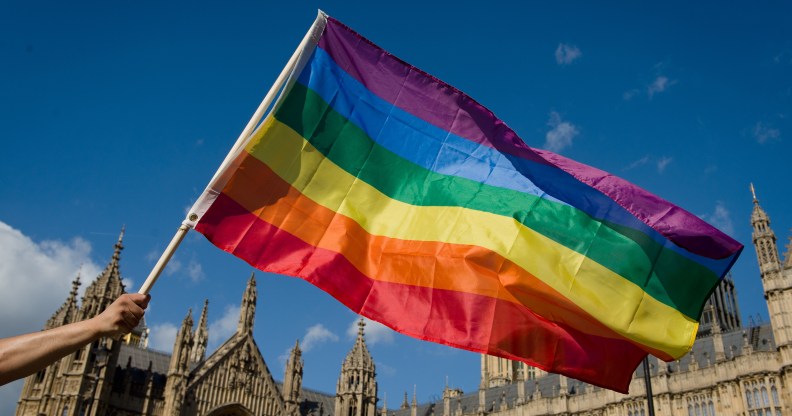Human-animal embryos approved by Commons

A protester holds a rainbow flag outside the Houses of Parliament in central London on June 3, 2013, as protesters gather in support of same-sex marriage (LEON NEAL/AFP/Getty Images)
The first of three clauses to the Human Fertilisation and Embryology Bill that Labour MPs have a free vote on has passed in the House of Commons. Former Equality Minister, Ruth Kelly voted against the government.
Scientists will be allowed to create human-animal embryos, from which they can harvest stem cells, but they must be destroyed after 14 days.
MPs rejected an amendment to ban their creation by 336 votes to 176. Three Catholic cabinet ministers Ruth Kelly, Des Browne and Paul Murphy voted against the government.
The Commons will now consider the creation of so-called ‘saviour siblings,’ a reduction on the time limit for abortion and proposals that will allow lesbians and single heterosexual women access to IVF and fertility treatments.
At present that law states that clinics must consider the need for a father.The government proposes to replace that with the consideration that the child would receive “supportive parenting.”
All Labour MPs are expected to support the bill as a whole in its later stages. Tory and Lib Dem MPs have a free vote all stages of the bill.
“We had always said that this would be treated as government business but we would find a mechanism by which individual MPs could express their conscience and that was what we were doing,” the Prime Minister’s spokesman said about whipping arrangements for the Bill.
Shadow Health Secretary Andrew Lansley has introduced an amendment calling for the “the need for supportive parenting and a father or a male role model” to be considered by doctors when deciding to treat women.
“It is in the interests of every child to have a mother and a father, but if no father is present, as is, unhappily, the case for many children today, a male role model should be available,” he told MPs last week.
“For that reason, I, personally, do not regard the substitution of “supportive parenting” for “father” as sufficient.
“The reference to the need for a father, which has not been reflected in the code, should be re-cast in the legislation.”
The government’s position remains that given the legal recognition of civil partnerships and laws preventing discrimination on the grounds of sex and sexual orientation, retaining any provision that mentioned a mother and a father is inconsistent with the wider government policy of promoting equality.
Conservatives argue that significant social problems are caused by the lack of a father in a child’s life, and that the legislation sends out a signal that fathers are not important.
Stonewall, the gay equality organisation that has championed this change in the law, rejected that argument.
“By necessity lesbian couples plan very carefully for their families and give careful consideration to the involvement of male role models,” a spokesman said.
“The most important thing for children is to grow up in a stable loving environment.
“Currently more than three million children in Britain are growing up in single parent families. If the bill’s provisions are amended not a single one will gain an additional parent.”
Gay rights groups argue that the “need for a father” provision is used to discriminate against lesbians accessing fertility treatments.

